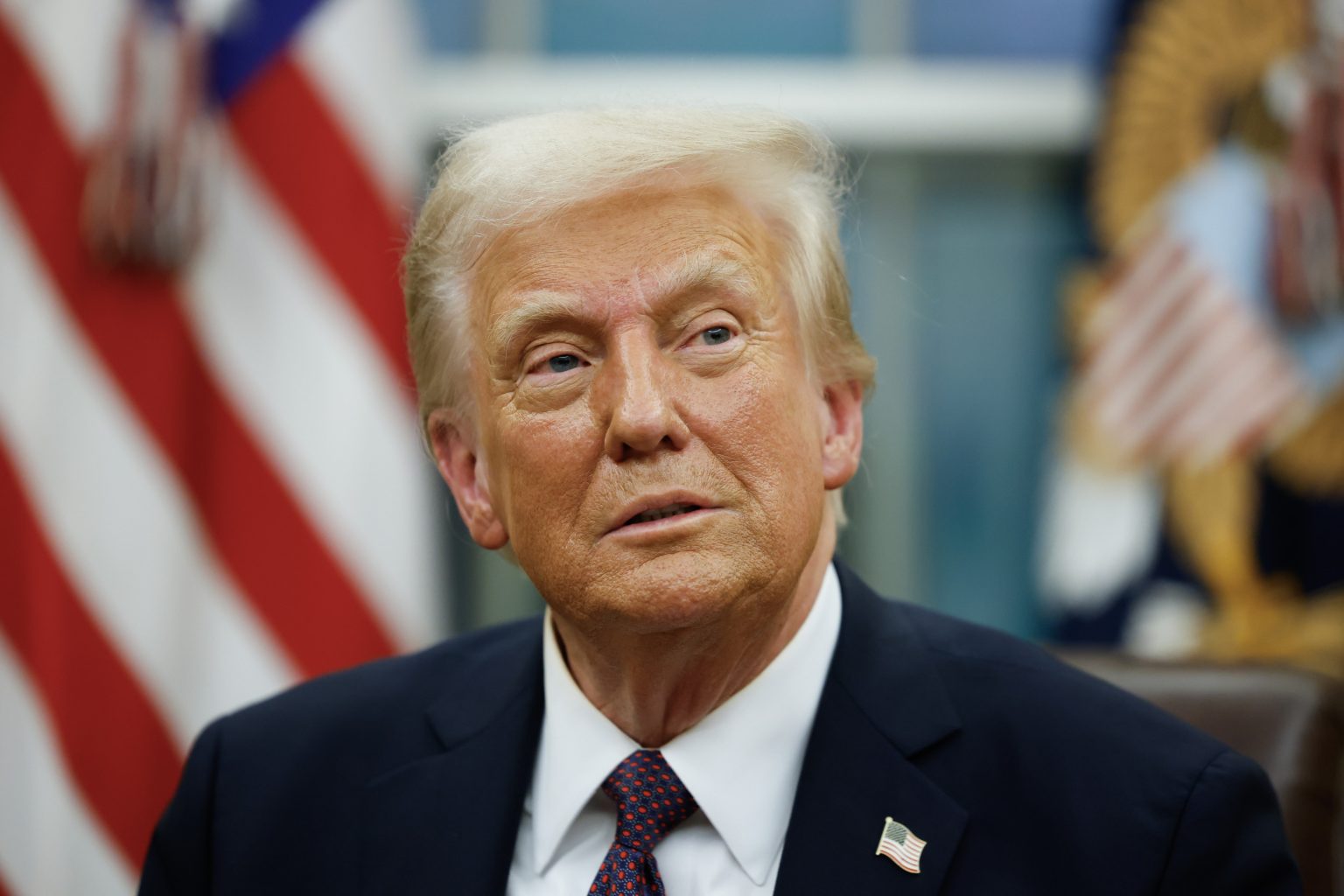Summarize this content to 2000 words in 6 paragraphs Legal experts have questioned how the Department of Justice (DOJ) will follow through with its plans to target state and local officials who resist President Donald Trump’s mass deportation initiative.Former federal prosecutor Neama Rahmani told Newsweek that the plans outlined in a memo written by acting Deputy Attorney General Emil Bove suggest the start of Trump’s “revenge tour” during his second term.Newsweek has contacted the White House and the DOJ for comment via email outside regular working hours.Why It MattersDemocrats have long raised concerns that Trump might use the federal government to target political opponents as retaliation. The president is already facing several legal challenges and opposition to executive orders announced on the opening day of his second term, including his attempt to largely end birthright citizenship.
President Donald Trump signs executive orders in the Oval Office on January 20, 2025 in Washington, DC.
President Donald Trump signs executive orders in the Oval Office on January 20, 2025 in Washington, DC.
Anna Moneymaker/Getty Images
What to KnowOne of Trump’s key 2024 campaign pledges was to launch the largest mass deportation of undocumented immigrants soon after returning to office.According to a memo obtained by The Associated Press and seen by Newsweek, Bove has directed federal prosecutors to potentially bring criminal charges against state and local officials who they believe fail to cooperate with the president’s plans to carry out the initiative.The memo notes that federal law prohibits state and local actors from “resisting, obstructing, and otherwise failing to comply with lawful immigration-related commands” and advises prosecutors to “take legal action” against those challenging such laws.The memo does not specify the legal actions that could be taken. This move sets up potential clashes with so-called “sanctuary” cities across the U.S., such as Chicago and Boston. These cities generally limit or deny cooperation with federal immigration authorities, including refusing to notify Immigration and Customs Enforcement (ICE) before releasing undocumented migrants from custody.Rahmani, president of West Coast Lawyers, suggested that the DOJ may charge local officials with hindering the deportation plans to “send a message” but questioned whether a judge would rule the charges warranted.He also noted that he had never seen the DOJ use laws related to the harboring of undocumented migrants to target state or local officials before.Robert J. McWhirter, a constitutional scholar and Arizona-based immigration lawyer, told the AP that local law enforcement officials are not obligated to cooperate with federal law enforcement.Criminal defense attorney Sam Bassett, a partner at Austin, Texas-based Minton, Bassett, Flores & Carsey, said the plans outlined in the memo suggest the administration is “ramping up” the potential consequences for sanctuary cities defying Trump’s mass deportation plans.What People Are SayingFormer federal prosecutor Neama Rahmani told Newsweek: “This may just be the beginning of Trump’s revenge tour and the DOJ prosecuting his political opponents or those standing in the way of his ambitious agenda. I prosecuted a lot of alien smuggling and harboring cases in my career, and I’ve never seen the DOJ use 8 U.S.C. 1324 or 1373 to charge state and local officials who aren’t complying with federal agents in enforcing immigration laws. It will be interesting to see how the courts handle these types of prosecutions because I fully believe that Pam Bondi and the DOJ will charge some state or local officials to send a message. The legal question for judges will be: Is inaction enough to be a violation of the law? Or will prosecutors need evidence that local officials took proactive steps to hide undocumented immigrants from federal authorities?”Criminal defense attorney Sam Bassett told Newsweek: “Obviously, this administration is taking a much more aggressive approach to locating and deporting persons in the U.S. without authorization. They are also putting uncooperative jurisdictional authorities—local law enforcement, prosecutors, and statewide law enforcement—on notice that they will consider prosecuting any individual or entity that obstructs or otherwise impedes a lawful federal law enforcement investigation. The use of criminal prosecution of such actors is one of the options, from what I am seeing. This is definitely a ramping up of potential consequences for jurisdictions sympathetic to immigrants who are not here lawfully.”Immigration lawyer Robert J. McWhirter told the AP: “What would you charge these people with? Nothing obligates local law enforcement to cooperate with federal law enforcement on any issue—not even bank robbery.”Acting Deputy Attorney General Emil Bove wrote in the memo to DOJ employees: “Federal law prohibits state and local actors from resisting, obstructing, and otherwise failing to comply with lawful immigration-related commands. Laws and actions that threaten to impede Executive Branch immigration initiatives, including by prohibiting disclosures of information to federal authorities engaged in immigration-enforcement activities, threaten public safety and national security. The Civil Division shall work with the newly established Sanctuary Cities Enforcement Working Group within the Office of the Associate Attorney General to identify state and local laws, policies, and activities that are inconsistent with Executive Branch immigration initiatives and, where appropriate, to take legal action to challenge such laws.”What Happens NextThe DOJ may face legal challenges if it follows through with plans to prosecute state and local officials for not carrying out federal immigration policies.


